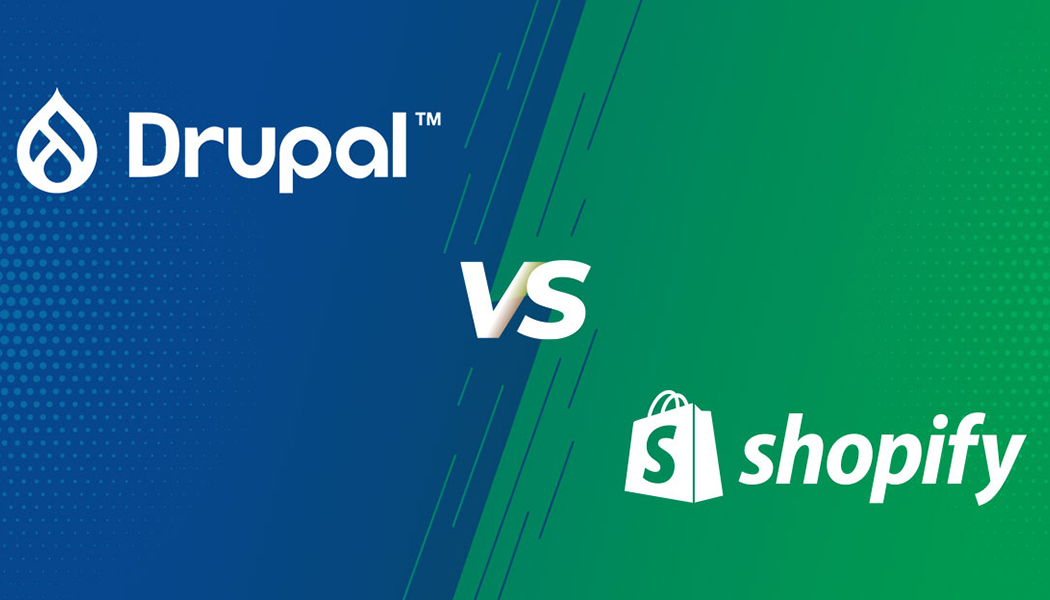Shopify vs. Drupal- What's best for your eCommerce business?
If you want to enter the world of eCommerce, there are many platforms out there. The eCommerce world is vast, and you have to know what you need to choose a platform that works for you.
You have to decide and consider a few things before choosing a platform, such as what you will sell online and why? Who will be your target audience? Who can you best serve with whatever you're selling? Once you figure out these essentials, you will need a platform for your online store.
Now, this is where the real trouble begins. Many eCommerce platforms are available in today's world, so you have to pick up an eCommerce platform that suits your business needs the most.
When it comes to eCommerce platforms, two great platforms are Shopify and Drupal. With incredible features, available plans, and quality performance, both of these platforms are used by thousands of business owners and developers around the globe.
Before we begin with the Shopify vs. Drupal comparison, let's know a little about both of these platforms in brief.
What is Shopify?
Shopify is a well-known and one of the most popular eCommerce platform. It is an easy to use store builder that allows anyone to set up an online store and sell their products online. Shopify is one of the leading eCommerce platform for businesses of all types and sizes.
Hundreds and thousands of entrepreneurs from across the globe trust Shopify for its unique features and performance to sell their products online. Apart from having great features, it also offers great customization options to develop personalized online stores. Thus, we can say Shopify is one of the largest eCommerce platforms right now.
What is Drupal?
Drupal is one of the oldest tools available for eCommerce today. Although it is there longer than WordPress, it lacks a significant market share. Drupal is an open-source web content management framework written in PHP.
It provides a back-end framework for 2.3% of all the websites worldwide. Drupal offers excellent features and reliable performance, as well as security. Drupal's most notable feature is its flexibility, which sets it apart from the rest of the frameworks.
After discussing these platforms, let's talk about their pros and cons.
Shopify Pros
-
Shopify eCommerce platform offers loads of customization options and themes to choose from. In Shopify, there is a lot of scope for personalization.
-
Shopify has unique eCommerce features that help in the smooth running of the store. There are tons of eCommerce software tools as well.
-
Shopify is one of the most flexible eCommerce platforms available. In Shopify, you can find plugins for everything.
-
Shopify has a vast community, making it easier to reach out for help to the community in case of any difficulty or error.
-
Shopify has a simple back end, which makes it an easy-to-use platform. It doesn't have a complex codebase.
Shopify Cons
-
Shopify comes with higher transaction fees, which is not the case with Drupal.
-
Shopify isn't open source like Drupal, and therefore, one can't do much of the code tweaking.
Drupal Pros
-
Drupal is a perfect framework for online selling worldwide, which makes it a global eCommerce platform. It is a full-featured platform that also supports shopping carts, multilingual checkout forms, and much more.
-
Drupal offers integration of third-party solutions for various services such as fulfillment services, gateways, accounting applications, and more.
-
Drupal provides complete design freedom. It is the most flexible framework out there.
-
Drupal is continuously updating and coming up with new and advanced features with every new update. Its functionality is improving all the time.
Drupal Cons
-
Although Drupal offers third-party support, it supports is not as efficient as that of Shopify's.
-
Drupal can be a problematic framework for beginners. For those who don't have much knowledge of coding, Drupal can be challenging to use.
Mentioned above were the pros and cons of both of these platforms. Although these platforms are highly functional and feature-rich, they are not perfect, and hence, both of these platforms come with their limitations.
Moving on, we are going, beginning with the Drupal vs. Shopify comparison. This comparison guide will help you choose one platform which best suits your business requirements and benefits you the most.
So, let's begin with the comparison of these two eCommerce giants.
1. Themes and templates
Let's talk about the themes of both of these platforms. Using suitable themes enhance the appearance of the store. Let's talk about the themes of both of these platforms.
Shopify- Shopify offers easy-to-use templates for your website. It helps in getting your site up and running in a concise amount of time. Premium Shopify themes and professionally designed templates that you can use for your online store.
You can choose any theme which best suits your store and makes it look attractive and appealing. It also gives you an option to quickly make changes in the existing template to make it work better for your business.
Drupal- Drupal eCommerce does not provide the option to use existing themes or templates like Shopify. Drupal requires a graphic designer or web developer to build a custom website for your business. In Drupal, you can use themes contributed by others. You can also create a sub-theme of an existing theme in Drupal.
Thus, we conclude that when it comes to themes and templates, Shopify is the winner.
2. Design and customization
Design and customization are two essential factors of any eCommerce platform. These features make a website look attractive and feel incredible. A website or store should be well designed, which attracts the customers and ranks high on Google. Let's talk about the design and customization of Shopify and Drupal.
Shopify- Shopify is easy to use and versatile. It has tons of free and premium themes to choose from for your eCommerce store. Shopify is an excellent solution for businesses of all kinds, and it is a great website builder. If you are thinking of building a SaaS company, then Shopify is the right choice. Shopify allows users with limited knowledge in design to start building a store.
Drupal-When you choose Drupal, you need to have an understanding of coding. If you are new to Drupal, it will take a little time to apply the right features and make your website work precisely the way you want it. In Drupal, there is no drag-and-drop functionality, and you have to code everything from scratch. Thus, with Drupal, you require to put extra efforts.
Thus, we conclude that both Shopify and Drupal allow personal customization of your website, but Shopify is much easier than Drupal in this regard. Shopify easily allows users with limited knowledge to customize the site, which is not the case with Drupal.
3. List of Features
Both Shopify and Drupal offer unique and powerful features that help in the efficient running of the eCommerce store. Let's look at some of the features that these platforms provide-
| Shopify | Drupal |
| Advanced shopping cart features | It supports adaptability and customization |
| It is a web-based website builder | It offers integrations with social networks |
| It is a full blogging platform | It supports multiple languages |
| It has 70 payment gateways | It supports multiple currencies |
| It offers flexible shipping rates | It is optimized for mobile devices and interface |
| It automatically calculates taxes | It offers compliance to international standards |
| It offers 100+ professional themes | It offers design freedom |
These were some of the notable features of both of these platforms. These platforms fulfill the requirement of offering innovative features for the development of powerful eCommerce stores. Thus, when it comes to features, both of these platforms are doing their best.
4. Integrations
Integrations are built on APIs and allow the flow of information between apps connecting the software. Both Shopify and Drupal support integrations with business systems and applications.
Shopify- Shopify supports the integrations with the following-
- MailChimp
- QuickBooks
- itDuzzit
- Zapier
- Chargify
Drupal- Drupal supports the integrations with the following applications-
- Xero
- SagePay
Both of these platforms offer integration with several business systems and applications and hence. We can say that both Shopify and Drupal integrate well with third-party applications.
5. Customer support
Having access to customer support is crucial when you are want to accomplish great things as an online store owner. Customer support plays a vital role in gaining users' trust. When the clients come across any issue or problem, they will turn to the customer support for assistance. Let's talk about the customer support of both of these platforms.
Shopify- Shopify is pretty helpful and has active customer support available. It is actively there to help and assist users with their websites and storefront. It also offers twitter and lives chat to give quick responses to the questions and queries.
It also provides email and phone support, which is very helpful for users and developers. Shopify expert services are of high quality, and the customer support is very efficient.
Drupal- As we know, Drupal is a little more challenging to use than Shopify; it still offers excellent support when you require it. You can look for the knowledge base and check out the website to answer your questions.
You can also visit the Drupal forum and ask questions about everything and find the solution there. A platform that offers excellent customer support wins users' trust, and Drupal does this job very well. However, Drupal doesn't support email and live support.
We can say that both platforms are doing their job well when it comes to customer support. Anyone can benefit from the excellent quality of customer support. Thus, we can say that both of these platforms are offering efficient customer support, but Shopify offers email and live support, which Drupal fails to provide.
You can hire Shopify developers from a Shopify store development company for the most beneficial Shopify store development services.
Drupal vs. Shopify -Which is the right solution for you?
When choosing one platform between Shopify expert services and Drupal eCommerce, there's no specific answer as everyone has their preferences. Every business owner has different preferences, expectations, and requirements, and therefore, everyone's choice will be different.
Although Shopify is the go-to choice for people who want a quick and easy way to set up their online store, Shopify is easy to use, diverse, full of customization options, and various add-ons. Shopify also offers fantastic customer support, which makes it one of the best eCommerce platforms today. Shopify is the most suitable platform for those who want to build a website easily and quickly.




